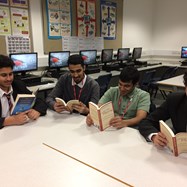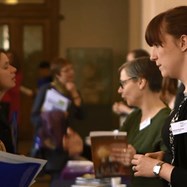Public Accounts Committee report on widening participation
22 September 2015
Responding to the House of Commons Public Accounts Committee report, ‘Widening Participation in Higher Education’, the Director General of the Russell Group, Dr Wendy Piatt, said:
“As the Committee points out, the main obstacle to widening participation in our universities is educational under-achievement. If a child from a lower social group succeeds in overcoming the barriers s/he faces and achieves good grades at A Level (or the equivalent), then s/he is highly likely to go to university. But many students from low income backgrounds do not have the grades, the aspirations or the encouragement to apply to university.
“Russell Group universities are doing everything they can to ensure that talented students from every background have the chance to benefit from a degree. We are helping to raise academic attainment and aspirations by working closely with local schools, colleges and community organisations, organising summer schools and providing access courses and by dramatically increasing the amount of money committed to outreach and widening participation. Russell Group universities are constantly trying to improve the ways we identify potential and seek out those who would not normally consider applying to a Russell Group university. But ultimately, we cannot admit students who not apply.
“The Russell Group has welcomed the request for a single document to outline universities’ widening participation investment and activities. This will give our universities the opportunity to showcase their links with schools and colleges and outline the extensive additional resources devoted to outreach, which are not reflected in the current access agreements. It is important that this document captures the broader commitment and the valuable work being undertaken to widen participation and improve access. As the Public Accounts Committee recognises, Russell Group universities do not always directly benefit from outreach and widening participation activities, as many pupils who receive this help apply elsewhere, but we recognise our role in helping all students to fulfil their potential.
“The Committee’s report helpfully points to the important influence that parents and teachers can have on the life chances of young people. The Russell Group is very concerned by recent findings from the Sutton Trust that many pupils – particularly those from lower social backgrounds - do not receive adequate information, advice and guidance at school about higher education. We are also alarmed by increasing evidence that some teachers may not be encouraging some of their students to consider Russell Group universities. It is particularly important that pupils from families who haven’t been to university, or who have less knowledge about higher education than others are given robust support and guidance at school. To help address this problem, The Russell Group will, this spring, be holding a special joint conference for teachers and advisors, which will aim to explain all aspects of applying to our universities in a straightforward and transparent way.
“This past year Russell Group universities have improved across key indicators relating to widening participation. However, we consider the benchmarks used in this report to be unhelpful and inaccurate for a number of reasons.”
Notes to editors
- The Public Accounts Committee’s fourth report “Widening Participation in Higher Education” will be available from here: http://www.publications.parliament.uk/pa/cm/cmpubacc.htm
- Paragraph 3 of the report states “The difference in rates of higher education participation can largely be explained by differences in school attainment. Low achievement by pupils at school is the principal explanation for variation by socio-economic background.”
- A recent report by ‘Supporting Professionalism in Admissions’ (SPA) highlighted the successful way Russell Group universities join-up widening participation and admissions projects to target under-represented groups in higher education
SPA’s second report on Research Findings states: “Institutions in the Russell Group were most likely to regularly: develop projects with the widening participation team; share admissions data with the widening participation team; take part in outreach work; target under-represented groups and target post-application” (Table 15b); Fair admissions to higher education a review of the implementation of the Schwartz Report principles three years on: Report 2: Research Findings, Question 13, page 30 - A recent report by the Sutton Trust for the National Council of Educational Excellence found that “at least half of careers and education advice [in state schools] is inadequate or inappropriate” http://www.suttontrust.com/news.asp#a053
A survey from the Sutton Trust last year also found a significant proportion (45%) of teachers surveyed either rarely or never encourage their academically-gifted pupils to apply to Oxford or Cambridge. http://www.suttontrust.com/news.asp#a044 - The widening participation performance indicators provide broad measures of increased participation by underrepresented groups in higher education. They are not targets, nor were they intended to be. HEFCE’s first report on these indicators notes: “the success of an institution’s access policies cannot be gauged by looking at the ‘access’ indicators alone … Institutions need to be able to identify entrants with the potential to benefit from higher education” http://www.hefce.ac.uk/pubs/hefce/1999/99_11.doc
Three key factors which account for the relatively low proportion of students from 'non-traditional backgrounds' at Russell Group universities are not factored in to the benchmark figures.
- The use of UCAS tariff points inflates the quantity of potentially qualified applicants as these pupils may not have the qualifications required to enter their chosen course.
- The tariff includes points for a broad range of achievements and awards which would not normally be taken into account in the admissions process at our universities.
- The benchmarks do not take into account whether students have the necessary subject combination for particular areas of study.
- The number of applications from ‘non-traditional’ pupils is not taken into account. Lack of applications from such groups is one the main difficulties Russell Group universities face in widening participation.
-
Hamir Patel
hamir.patel@russellgroup.ac.uk
020 3816 1316
-
Hollie Chandler
Hollie.Chandler@russellgroup.ac.uk
020 3816 1307
 X
X


